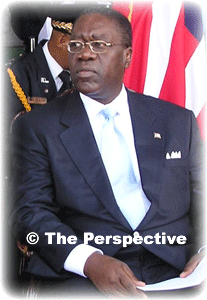
Gyude Bryant’s Interim Government Spent US 8.6 Million Dollars Without Budgetary Approval
By Winsley S. Nanka
Wnanka@theperspecive.org
The Perspective
Atlanta, Georgia
December 15, 2004
|
Furthermore, the report states that the interim government has failed to “give any sign of macro-economic policy orientation”. Macro-economic policy orientation is geared towards the promotion of economic growth, ensuring that economic growth reduces poverty, increases output of goods, services and employment, contains inflation, and produces sound fiscal and financial management systems.
The latest UN Panel of Experts report is an indication that the interim government misled the International Monetary Fund’s experts that visited Liberia earlier this year into believing that the government was committed to macro-economic stabilization programs. On March 25, 2004, the International Monetary Fund released a report, which indicated that the Liberian government has taken steps to “implement series of measures to improve budgetary oversight and transparency”. The measures the government is said to have implemented included the centralization of all revenue collections at the Ministry of Finance, the centralization of government account, budgetary controls, among others.
The United Nations Panel of Experts observed in the December 6, 2004 report that there exist large variances (gaps) between budgetary allocations and the actual expenditures incurred. The UN is saying, for example, a government official had a budget of $10,000 to purchase 400 bags of rice for displaced people. Instead, the government official presented a voucher for $18,000 to the Ministry of Finance for the 400 bags of rice. In the given example, the government official and his associate (s) pocketed the difference of $8,000.
Meanwhile, the UN panel is recommending that the Liberian government turns over the management of the Forestry Development Authority (FDA) to a private management firm because of the “inability of the FDA to enforce the law” and the failure of the FDA to complete the “reforms required by the Security Council to ensure that the sector is not a source of conflict”. The FDA, like almost all Liberian government institutions has not shown the competency to efficiently manage the forest resources of Liberia.
The UN report is evidence that Liberian government officials and their collaborators, in the face of the lack of basic services such as water, electricity, and the failure to initiate any viable social economic development project are plundering the resources of Liberia. In view of the misuse of Liberia’s resources, every democratic minded Liberian has the responsibility to appeal to the United States and Great Britain to use their influences at the United Nations to maintain the diamond and logging sanctions imposed on Liberia until a democratically elected government takes power in 2006. If the Liberian people do not take steps to limit the inept regime in Monrovia further access to the resources of Liberia, it would be difficult for an elected government to have the resources necessary to initiate social economic development programs in Liberia.

